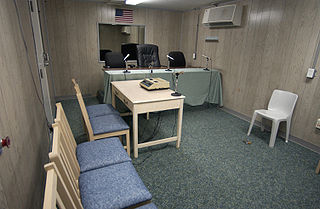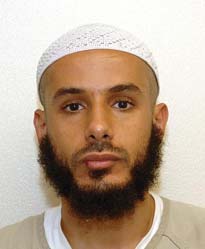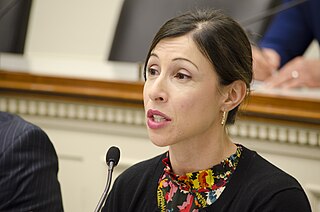Related Research Articles
Enemy combatant is a person who, either lawfully or unlawfully, engages in hostilities for the other side in an armed conflict. Usually enemy combatants are members of the armed forces of the state with which another state is at war. In the case of a civil war or an insurrection "state" may be replaced by the more general term "party to the conflict".

The Combatant Status Review Tribunals (CSRT) were a set of tribunals for confirming whether detainees held by the United States at the Guantanamo Bay detention camp had been correctly designated as "enemy combatants". The CSRTs were established July 7, 2004 by order of U.S. Deputy Secretary of Defense Paul Wolfowitz after U.S. Supreme Court rulings in Hamdi v. Rumsfeld and Rasul v. Bush and were coordinated through the Office for the Administrative Review of the Detention of Enemy Combatants.
Ali Saleh Kahlah al-Marri is a citizen of Qatar who was sentenced to serve an 8-year sentence in a United States federal prison. He pleaded guilty to one count in a plea bargain after his case was transferred in 2009 to the federal court system.

Fouzi Khalid Abdullah Al Odah is a Kuwaiti citizen formerly held in the United States Guantanamo Bay detainment camps, in Cuba. He had been detained without charge in Guantanamo Bay since 2002. He was a plaintiff in the ongoing case, Al Odah v. United States, which challenged his detention, along with that of fellow detainees. The case was widely acknowledged to be one of the most significant to be heard by the Supreme Court in the current term. The US Department of Defense reports that he was born in 1977, in Kuwait City, Kuwait.

Bensayah Belkacem is a citizen of Bosnia, previously held in the United States Guantanamo Bay detainment camps, in Cuba. Born in Algeria, he was arrested in his home in Bosnia, on October 8, 2001, shortly after the attacks of September 11, 2001.
Mark P. Denbeaux is an American attorney, professor, and author. He is a law professor at Seton Hall University School of Law in Newark, New Jersey and the Director of its Center for Policy and Research.
Abdel Hamid Ibn Abdussalem Ibn Mifta Al Ghazzawi is a citizen of Libya who was held from June 2002 until March 2010 in the Guantanamo Bay detainment camps, in Cuba because the United States classified him as an enemy combatant. His internment number was 654.
The Center for Constitutional Rights has coordinated efforts by American lawyers to handle the habeas corpus, and other legal appeals, of several hundred of the Guantanamo detainees.
Boumediene v. Bush, 553 U.S. 723 (2008), was a writ of habeas corpus submission made in a civilian court of the United States on behalf of Lakhdar Boumediene, a naturalized citizen of Bosnia and Herzegovina, held in military detention by the United States at the Guantanamo Bay detention camps in Cuba. Guantánamo Bay is not formally part of the United States, and under the terms of the 1903 lease between the United States and Cuba, Cuba retained ultimate sovereignty over the territory, while the United States exercises complete jurisdiction and control. The case was consolidated with habeas petition Al Odah v. United States. It challenged the legality of Boumediene's detention at the United States Naval Station military base in Guantanamo Bay, Cuba as well as the constitutionality of the Military Commissions Act of 2006. Oral arguments on the combined cases were heard by the Supreme Court on December 5, 2007.
Al Odah v. United States is a court case filed by the Center for Constitutional Rights and co-counsels challenging the legality of the continued detention as enemy combatants of Guantanamo detainees. It was consolidated with Boumediene v. Bush (2008), which is the lead name of the decision.
In United States law, habeas corpus is a recourse challenging the reasons or conditions of a person's detention under color of law. The Guantanamo Bay detention camp is a United States military prison located within Guantanamo Bay Naval Base. A persistent standard of indefinite detention without trial and incidents of torture led the operations of the Guantanamo Bay detention camp to be challenged internationally as an affront to international human rights, and challenged domestically as a violation of the Due Process Clause of the Fifth and Fourteenth amendments of the United States Constitution, including the right of petition for habeas corpus. In 19 February 2002, Guantanamo detainees petitioned in federal court for a writ of habeas corpus to review the legality of their detention.

David H. Remes is an American lawyer.

Lakhdar Boumediene is an Algerian-born citizen of Bosnia and Herzegovina who was held in military custody in the United States Guantanamo Bay detention camps in Cuba beginning in January 2002. Boumediene was the lead plaintiff in Boumediene v. Bush (2008), a U.S. Supreme Court decision that Guantanamo detainees and other foreign nationals have the right to file writs of habeas corpus in U.S. federal courts.

El Banna v. Bush, No. 1:04-cv-01144, is a writ of habeas corpus that was submitted on behalf of the Guantanamo captives Jamil al-Banna, Bisher Al Rawi and Martin Mubanga. They were United Kingdom citizens or residents.

Al Halmandy v. Bush, No. 1:05-cv-02385, is a writ of habeas corpus filed on behalf of 63 Guantanamo detainees, on December 13, 2005. It was one of over 200 habeas corpus petitions filed on behalf of detainees held in the Guantanamo Bay detention camp in Cuba.
El Mashad v. Bush is a writ of habeas corpus filed on behalf of several Guantanamo detainees, including Sherif el-Mashad, Adel Fattouh Aly Ahmed Algazzar and Alladeen.
Al Joudi v. Bush (Civil Action No. 05-cv-301) is a writ of habeas corpus filed on behalf of several Guantanamo detainees, including: Majid Abdulla Al Joudi, Yousif Mohammad Mubarak Al-Shehri, Abdulla Mohammad Al Ghanmi and Abdul-Hakim Abdul-Rahman Al-Moosa, before US District Court Judge Gladys Kessler. It was one of over 200 habeas corpus petitions filed on behalf of detainees held in the Guantanamo Bay detention camp in Cuba.

Al-Asadi v. Bush, No. 1:05-cv-02197, is a writ of habeas corpus filed on behalf of Guantanamo detainee Mohammed Ahmed Ali Al Asadi before US District Court Judge Henry H. Kennedy. It was one of over 200 habeas corpus petitions filed on behalf of detainees held in the Guantanamo Bay detention camp in Cuba.

Andrea J. Prasow is an American attorney and global human rights advocate. She leads The Freedom Initiative, a U.S.-based organization whose mission is "to bring international attention to the plight of political prisoners in the Middle East and advocate for their release." Prasow was appointed as The Freedom Initiative's executive director in November 2021.
References
- 1 2 3 Matt Apuzzo (June 20, 2008). "US asks to rewrite detainee evidence". Associated Press. Archived from the original on 2008-06-21. Retrieved 2008-06-21.
- ↑ "Jonathan Hafetz". Seton Hall University . Retrieved May 30, 2017.
- 1 2 "Jonathan Hafetz". Brennan Center for Justice. Archived from the original on July 4, 2008. Retrieved June 21, 2008.
- ↑ Jonathan Hafetz (June 12, 2008). "Supreme Court Deals Death Blow to Gitmo". The Nation. Archived from the original on August 28, 2008. Retrieved June 21, 2008.
- ↑ Jonathan Hafetz (October 9, 2006). "No Blank Checks on Torture". The Nation. Archived from the original on June 18, 2008. Retrieved June 21, 2008.
- ↑ Jonathan Hafetz (June 16, 2008). "Boumediene Guest Commentary: Jonathan Hafetz of the Brennan Center". Scotusblog. Archived from the original on June 18, 2008. Retrieved June 21, 2008.
- ↑ Jonathan Hafetz (April 16, 2006). "TD Blog Interview with Jonathan Hafetz". The Talking Dog . Retrieved June 21, 2008.
- ↑ Jonathan Hafetz (April 7, 2009). "A guest post from Jonathan Hafetz". Slate magazine. Archived from the original on March 6, 2009. Retrieved April 8, 2009.
- ↑ Jonathan Hafetz (September 30, 2008). "Statement of Jonathan Hafetz on Al-Marri v. Pucciarelli". ACLU. Archived from the original on April 10, 2009. Retrieved December 4, 2016.
- ↑ Glenn Greenwald (October 10, 2008). "Salon Radio: ACLU's Jonathan Hafetz on Guantanamo cases". Salon magazine.
- ↑ Jonathan Hafetz (October 27, 2007). "Torturegate". Huffington Post. Archived from the original on January 1, 2008. Retrieved April 8, 2009.